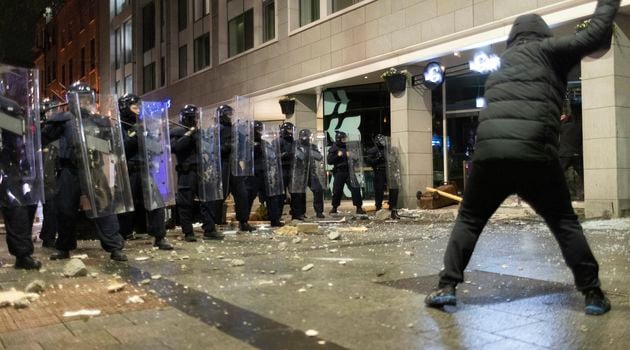[ad_1]

A majority of individuals on either side of the Border view hate crime as a “severe and rising drawback” of their jurisdiction, in keeping with a brand new report revealed on Monday.
It additionally discovered solely a minority of individuals in each jurisdictions regard the police or courts’ present response to hate crime as efficient.
The report beneficial the creation of a neighborhood of observe to facilitate cross-Border information switch and collaborative studying to handle hate on the island of Eire.
“What the information exhibits is that there’s huge goodwill on either side of the Border in direction of an inclusive strategy to offering legislative interventions towards being focused in your id,” mentioned Prof Jennifer Schweppe of the College of Limerick, and one of many report’s co-author.
“However on the identical time there are decrease ranges of public consciousness, notably of the prison justice provisions which are at the moment in place, than we wish to see.”
[ What are the proposed new hate crime laws and why the delay? ]
Commenting on the importance of final month’s riots in Dublin, her colleague, Prof Amanda Haynes, mentioned folks shouldn’t be complacent. “The far-right in Eire, I consider, is small, however I additionally consider that they’re harmful and that we should be continuously conscious of the potential for individuals who could also be disaffected for a wide range of causes… that these people is likely to be mobilised or radicalised by the suitable.
“What the analysis exhibits is that we’re at a turning level, and now we have a possibility now. We now have a society that really could be very appreciative of distinction and values distinction, and now we have to guard that.”
She mentioned it was “heartening” to see from their analysis that the general public’s strategy in direction of the trans neighborhood, which “has been the topic of very vocal and antagonistic debate publicly, it’s actually good to see that has not seeped into or impacted on the very supportive and heat strategy individuals are taking and that folks have in direction of the trans neighborhood”.
The research, Public Understandings of Hate Crime: Eire, North and South, was carried out by the College of Limerick in collaboration with Queen’s College Belfast, and was funded by the Shared Island Unit within the Division of An Taoiseach.
Its findings are primarily based on a survey carried out concurrently on either side of the Border in February 2023.
Within the Republic, a pattern of 1,000 respondents was surveyed and weighted for age, intercourse and faith to align with the inhabitants. In Northern Eire, the pattern – additionally of 1,000 respondents – was moreover weighted for socioeconomic components.
Noting that the North’s prison justice system has a “longer historical past of naming and addressing the issue of hate crime” than that within the South, the report mentioned the instance of Northern Eire supplied “helpful studying” to the Republic.
[ ‘Offensive’ views still possible under proposed hate crime Bill, McEntee says ]
Hate crime laws was launched in Northern Eire within the 2000s, however within the South, whereas Garda started recording racist crimes with discriminatory motivation in 2002, the laws is in progress and is anticipated to develop into regulation quickly.
There’s a “persevering with must develop mutual understanding throughout the Border and to share bridge-building successes”, the report concluded.
Different key findings embrace that on either side of the Border, the general public perceive and recognize each the direct and oblique harms of hate, with a majority appreciating that hate crimes usually tend to have a psychological impact on their victims, and that they unfold concern and isolation amongst minority communities.
Solely a minority within the North and South – lower than a fifth – felt punishing hate crime extra severely than non-hate crimes is a violation of freedom of expression.
There have been “regarding shortfalls” in public information relating to the present authorized place on hate crime in each jurisdictions.
The report made quite a few suggestions, together with a public data marketing campaign to handle gaps in public understandings of hate crime and prison justice responses which it mentioned must be “prioritised” throughout each jurisdictions.
It additionally advocated fostering additional social cohesion “inside and throughout borders by enhancing inter-group contact, particularly with the island’s transgender and Traveller communities and between folks from various neighborhood backgrounds, north and south”.
There also needs to be additional analysis into public understandings of hate speech, with explicit emphasis on public notion of what constitutes criminalised hate speech.
[ Dublin riots: Helen McEntee refuses to withdraw use of term ‘scumbag’ ]
Within the aftermath of the Dublin riots, Prof Haynes mentioned that, as a society, “we’re attempting to course of what occurred, and attempting to grasp the character of the issue we face.
“It’s actually necessary our interpretation of the riots and the best way we select to handle them going ahead is evidence-informed, and we have to monitor public opinion and inter-group relations on an ongoing foundation with a purpose to have this evidence-informed strategy to addressing any difficulties round social cohesion and social division inside our society,” she mentioned.
Join push alerts and have the perfect information, evaluation and remark delivered on to your phoneFind The Irish Instances on WhatsApp and keep as much as dateOur In The Information podcast is now revealed every day – Discover the most recent episode right here
[ad_2]
Source link

